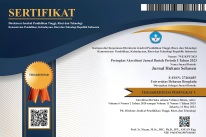Liability Of The Perpetrator Intentionally Accessing Another Person's Computer In The Implementation Of The Civil Servant Candidate Entrance Examination (Study Of Decision Number 702/PID.SUS/2022/PN.TJK)
Abstract
The era of globalization demands the rapid development of technology and information. Human life is inseparable from law, as mandated in the 1945 Constitution of the Republic of Indonesia. Civil servants play a crucial role in the governance and development of the country. This study highlights the criminal liability of defacing offenders, a cybercrime that damages the appearance of a website. The ITE Law regulates this act, threatening punishment for those who access computers without authorization and make modifications to electronic information belonging to others. This research examines a case in Lampung, where the perpetrator assisted CPNS test participants by accessing computers and modifying answers. Through normative and empirical juridical approaches, this research examines the criminal liability of the perpetrator, including the internal and external factors that motivated the act.
Downloads
Copyright (c) 2024 Bambang Hartono, Suta Ramadan, Adelia Febianita

This work is licensed under a Creative Commons Attribution-ShareAlike 4.0 International License.






